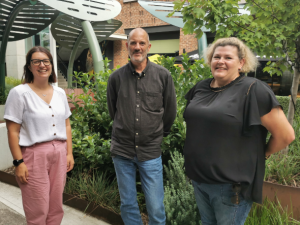By Connie Galati, Senior Clinical Psychologist, APS Mental Health and Suicide Prevention Unit, Australian Public Service Commission.
When Compassionate Foundations was released in February 2022, there was some nervousness about the subject matter.
- Is it okay to talk about mental health and suicide in the workplace?
- Can I talk to my colleagues about distress and suicide if I am not a psychologist or counsellor?
Developed by psychologists in the APS Mental Health and Suicide Prevention Unit (the Unit), Compassionate Foundations reframes the role APS workplaces and staff can have in suicide prevention.
“Suicide prevention is not just a health portfolio issue. It’s an important matter for the whole community, and something we can contribute to as public servants, regardless of what area we serve in.”
Rachael McMahon, Principal Psychologist and Director of the Unit.
“Our workplaces are a type of community we all belong to. We know that supportive social relationships and feeling connected to others can be a powerful buffer in reducing suicidal distress. Our APS workplaces can play a significant role, by being a touchstone of connection and providing a sense of belonging for our colleagues and customers who may come to us in distress.”
Connie Galati, Senior Clinical Psychologist

Compassionate Foundations takes an early intervention approach by focusing on our relationships with each other. It’s not about being a counsellor or solving people’s problems. The emphasis is on our human qualities, like being more compassionate, finding moments of connection and increasing our understanding of adversity and distress.
Connie says, “It’s more than a work skill, it’s a life skill that can be used any time, or any place. We heard from people with lived and living experience of suicidal distress and bereavement that these human-to-human moments are essential to the fabric of our communities, in order to reduce stigma and increase hope.”
The real test for Compassionate Foundations is what the APS staff completing the suite think. As a quality assurance and safety measure, the Unit regularly reviews the suite’s evaluation survey. The survey averages close to a 60% response rate, which meets best practice for generalising results.
Connie says, “Since its launch, 89% of participants are reporting Compassionate Foundations has built their suicide prevention capability, with 92% intending to implement what they have learned.”
“It is accessible, very person centered, and trauma informed.”
“'Window of Tolerance' and 'Bid for Connection' are now terms I use in my daily vocabulary and I have already applied in my personal relationships.”
– Compassionate Foundations participants.
Despite its subject matter, participants have also been drawn to Compassionate Foundations for its sensitive handling of the content.
“I didn't find the training confronting although I was told it might be. As a person who has lost a close family member to suicide, I felt it was pitched at the right level.”
“Thank you. As a person/carer with lived experience of suicide, I appreciate the topic being normalised in conversation and for the awareness, through support, that is being drawn to this complicated issue.”
“A very well presented course. As someone who struggles with suicidal thoughts very regularly I could tell a lot of care was taken when creating this course and a lot of attention to detail. Well done to all those involved, especially those discussing their own experiences.”
– Compassionate Foundations participants.
In addition to Compassionate Foundations being the APS Academy’s most popular eLearning, the suite’s consistent feedback from APS staff across all levels, roles and experience, highlights its true value and impact. Connie says, “93% of participants agree that Compassionate Foundations has been a positive learning experience and would go on to recommend the suite. The suite’s centralising of living wisdom is by far what staff value most about the course.”
“The language, scenarios and context all appropriate for the audience (APS staff). The lived experience reflections grounded the theory and skills, and allowed me to understand and respond compassionately to people with a lived experience.”
“The scenarios…. were realistic and practical. I'm also so impressed by the people with lived experience who shared their stories. Overall, the mix of formats was very effective and engaging.”
“This should be a mandatory learning unit for all APS staff.”
– Compassionate Foundations participants.
Connie says, “You don’t need to be a clinician to be able to make a difference. A simple act of compassion may be the life-raft a person needs to hold on to hope. Compassionate Foundations will help you to build your interpersonal and self-care skills to intervene early, before psychological distress occurs.”
“The course was practical and helped a non-clinician like me to be useful to a person under stress that could lead to suicide. Importantly the course showed the boundaries that non clinicians must observe and also it taught me about self-care.”
– Compassionate Foundations participant.
Australian public servants can sign up to Compassionate Foundations at no cost via APSLearn. APS agencies can request implementation resources and roll-out support from the Unit by contacting MHSP@apsc.gov.au.




